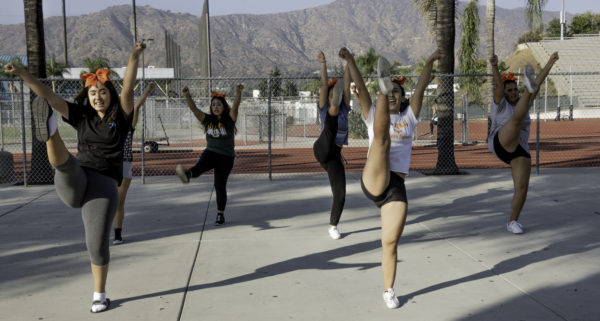Citrus Cheer team continue to push for accreditation for club to become sport
This is Citrus Cheer, and their smiles belie a long struggle to be regarded as a sport under campus restrictions. They are considered a club instead.
Every Tuesday, they practice their routines. Every football game, they are ready to boost the morale of the players and the crowd. Every basketball game, they are distinguished from the crowd by their uniformity in white apparel.
With bow ties pinned to their ponytails, they firmly grip their orange and blue pompoms and always show a smile.
Cheer was a registered sport at Citrus in the past, and the current members have gone to great lengths to get cheer instated in the athletics department.
Cheer Club captain and psychology major Fatima Sanchez, 20, and co-captain and communications major Naomi Gonzales, 19, are the successors to the movement of making cheer a sport.

Fatima Sanchez 20, Jayri Salgado 19, Cayla Fujita-Haffner 19, Naomi Gonzales 19 , and McKaylen Raines 19 practice their kickline for the Citrus College cheerleaders on Oct. 30.
Both women have been in Citrus Cheer for two years. Sanchez has been cheerleading since she was 4 years old, while Gonzales participated in dance during high school.
Because cheer is not considered a sport within Citrus College, everything they do is self-funded.
Uniforms can cost anywhere from $150 to $200, a bill falling entirely on members to pay.
This only covers the basics of the outfit: a shell top, skirt and underliners. Other accessories like pompoms and bows are an additional cost, ranging from $5 to $10.
Cheer club member and psychology major Mckaylen Raines, 19, said “(Sanchez and Gonzales) have to basically break off their arm to give it to pay for stuff, which none of us should be having to deal with in order to be a part of this.”
There has also been discussion among the cheer team about not continuing, due to the high fees and delays in receiving their uniforms.
Uniforms are not the only expense. Traveling to away games is done using personal vehicles and the girls’ own funds, going as far as San Diego and Santa Barbara.
“I forgot where the other one is at, but it was a three hour drive,” Sanchez said of the Santa Barbara event. Only four women attended.
“(Other teams) have a lot of things that we don’t have. Like for away games, we don’t have a bus or whatever they get to get them from point A to point B, there and back,” Raines said.
They travel via carpool, and whoever is available goes by themselves to represent the Citrus Owls. They are responsible for their own gas expenses and are not reimbursed for it.
Other sports, such as football and softball, travel via buses or vans to their away games.
“The boys get free transportation, and we get left with the short end of the stick,” Gonzales said.
Despite the trials of existing as a team functioning as a club, the women still hold their excitement about being a part of the squad.
As a club, the cheer team must follow the rules and restrictions of the Inter Club Council. Article IV, section 5 of the Associated Students of Citrus College/ICC Club Constitution states that a representative of a club must attend every ICC meeting.
Last semester, the Citrus Cheer team was deactivated for not attending any ICC meetings.
“We were just members, so we didn’t know what it took to put the club together. Our captain at the time didn’t attend three ICC meetings, and our club was deactivated,” Gonzales said.
If the cheer advisor is not present, the cheer team is not allowed to be on the field to cheer.
“I would have to go instead of being at practice and so I couldn’t be there for the girls, and I got behind on the cheers because I had to be at the ICC meetings,” Gonzales continued.
Confined to the flimsy metal stands at home games, simple routines can be dangerous.
Each member of the club must fill out liability paperwork to practice on the field and have it approved by the ICC board.
Required to attend every meeting and every game, club advisor Nathan Rodriguez has had an active role in the success of Citrus Cheer. “I can make it to most of them, and I enjoy them. But if I can’t go, they either need to find another advisor or it’s just a hassle,” he said. “Usually if I can’t make it, they just don’t cheer.”
The restrictions on cheer also affect how they can practice. They are not allowed to perform stunts, which are considered to be anything from an athlete being airborne to simple cartwheels.
“We’re not allowed to even tumble,” Sanchez said.
This limits the performances to being similar to a dance routine.
On the California Community College Athletic Association website, Cheer/Pep Squad is not labeled as a sport.
Title IX states that for an activity to become a sport, there must be an alternative sport that caters to students of the opposite gender.
In a September 17, 2008 U.S. Office for Civil Rights Dear Colleague Letter titled Athletic Activities Counted for Title IX Compliance, any activity that has a governing organization, coaches and practices with competitions during a certain season can be considered a sport, as long as competition is the primary goal of the activity — and not just for support of other sport teams.
However, cheerleading is not considered a sport under Title IX because of the 2009 court case Biediger v. Quinnipiac University.
In 2010, eight universities and colleges formed the National Collegiate Acrobatics and Tumbling Association with the primary goal of making competitive cheer an official NCAA sport.
Those eight universities/colleges were Oregon, Maryland, Baylor, Ohio State, Fairmont State, Fort Valley State, Quinnipiac and Azusa Pacific University.
With a neighboring university being a champion of the movement, victory is so close yet so far.
Mount San Antonio College, another neighboring institution, labels their pep squad as a sport on their official athletics website. Their team is allowed to take part in competitions.
Citrus College’s athletic department heads are all aware of the cheer team’s presence at games, but most were unable to give more information about the reasons why cheer can no longer function as a sport team on campus or what it would take for them to reclaim their title.
Assistant Athletic Director Jackie Boxley said, “Cheer is not considered a sport at the NCAA level and in California Community College Athletics we, for the most part, mirror what the NCAA does.”
Boxley admits that even though it was not a great answer, it is the actual reason why cheer is not considered a sport at Citrus College.
“In my 15 years here, I have never been asked about changing a club to a sport, so I cannot give you an answer about that because I just don’t know,” Boxley said.
Although he is a relatively new faculty member, Citrus Sports Information Coordinator Chris Peterson said he has seen great strides by the cheer squad to become more organized.
“It’s not impossible,” Rodriguez said of becoming a registered sport.
“The biggest thing, aside from the money, is the authenticity of being a sport. We’re not looked as a sport. We can’t go to competitions. We can’t cheer, basically, because we can’t do stunts,” Gonzales said. “We’re just on the sidelines.”



